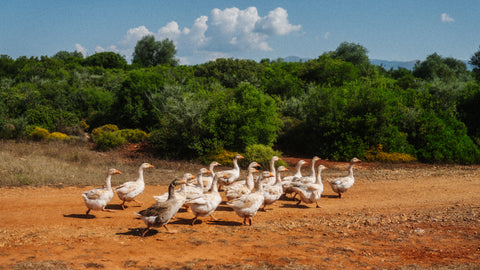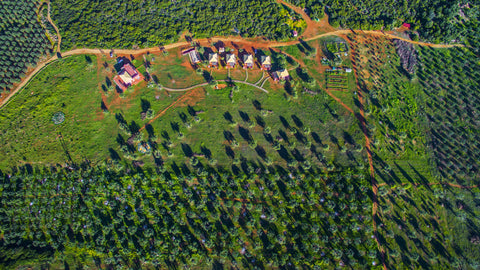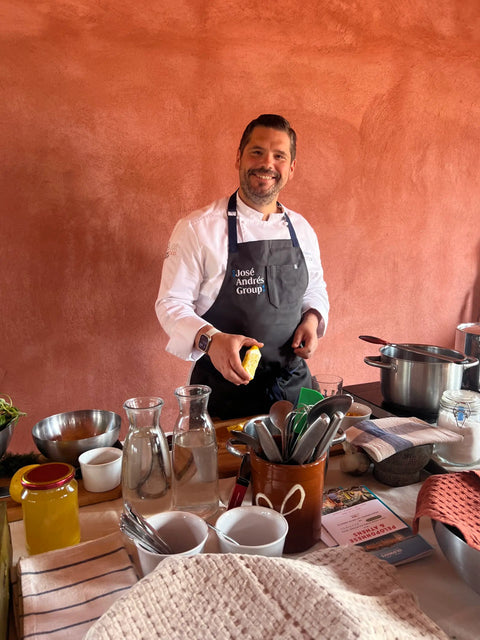We tried various methods to combat the grasshoppers. A fermented garlic spray offered some early-stage protection, but it required daily application and became ineffective once the grasshoppers matured. Zeolite powder, another experiment, aimed to suffocate the insects by clogging their breathing holes, but it failed in practice. We even delayed planting until after the grasshoppers’ life cycle ended, but this strategy sacrificed our summer harvest, leaving us with vegetables only in the fall.
Last year, we turned to nature for a solution. We wondered how we could control the grasshopper population naturally and sustainably, without wiping them out completely. The answer was simple: introduce their natural predators—birds—into the ecosystem. What better choice for a farm than poultry?
We quickly got to work, fencing off the vegetable gardens and setting up a safe, cozy coop. We then brought in chickens, ducks, and geese. To our delight, this strategy worked immediately. Ducks, in particular, have an appetite for grasshoppers. Not only did they keep the pest population in check, but they also provided us with fresh eggs daily. All we had to do was feed them twice a day and secure them at night from predators like foxes.
During the day, the poultry roamed freely, eating grasshoppers and grazing on the farm’s grass. Fortunately, they preferred the grasshoppers over our plants. Once the grasshopper population dwindled, we separated the poultry from the vegetable garden to prevent them from turning their attention to our juicy tomatoes.
The results were astounding. Last summer, we enjoyed an abundance of juicy tomatoes, flavorful peppers, and other seasonal vegetables. The only crops that suffered were those planted outside the fenced area, where the grasshoppers devoured everything except the melons.
The Next Generation of Natural Guards
Our success prompted us to expand our poultry population. We invested in an incubator to hatch the next generation of garden guards. The incubation process required patience and care, but seeing the young ducklings grow and start their grasshopper patrol made it all worthwhile.
Ducks and geese are naturally independent and social animals. We trained them to roam freely around the farm during the day and return to their coop at night. They’ve even learned to identify grasshopper nests and get to work before the pests spread across the farm. Our dogs have also accepted the new additions, ensuring harmony on the farm.
We also raised a new generation of chickens, currently about a month old, to patrol the vegetable garden and handle any grasshoppers that manage to get inside. With this double line of defense—ducks and geese outside and chickens inside—we’ve significantly reduced the grasshopper threat.
Our Benefits Are Plentiful
This natural approach has brought multiple benefits to our farm:
- Natural Defense for Summer Vegetables: Ducks and geese effectively control the grasshopper population, protecting our crops.
- Time Saved on Grass Cutting: The poultry graze on the grass, reducing the need for manual cutting.
- Enriched Soil: Poultry manure is a valuable fertilizer, enhancing soil health.
- Balanced Ecosystem: By managing the grasshopper population, we’ve created a more sustainable farm environment.
- Fresh Eggs Daily: Our poultry provide us with a steady supply of fresh, flavorful eggs.
- Organic, Free-Range Meat: We enjoy high-quality, free-range meat from our ducks and chickens.
- A Complete Ecosystem: The addition of poultry has enriched our farm’s ecosystem, making it more resilient and diverse.
- Joy for Farm Visitors: Children love visiting the farm to see the animals, adding an extra layer of happiness to our daily lives.
And all of this comes at almost zero cost! By working with nature instead of against it, we’ve transformed our farm into a thriving, balanced ecosystem that benefits both us and the environment.




Comments (0)
There are no comments for this article. Be the first one to leave a message!